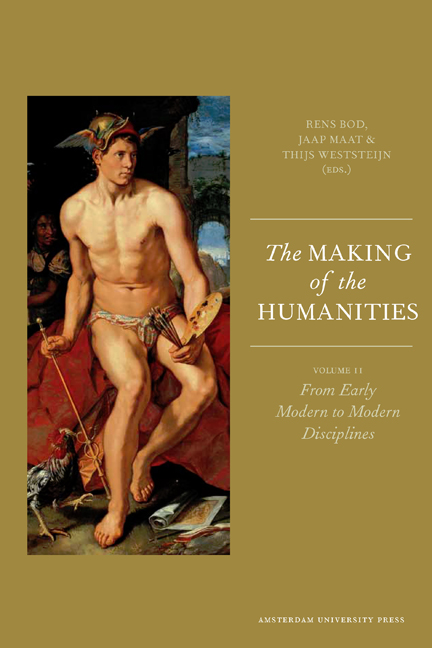Book contents
- Frontmatter
- Contents
- Introduction: The Dawn of the Modern Humanities
- I Linguistics and Philology
- II The Humanities and the Sciences
- III Writing History and Intellectual History
- IV The Impact of the East
- V Artworks and Texts
- VI Literature and Rhetoric
- VII Academic Communities
- Contributors
- List of Figures
- Index
The Rise of Philology: The Comparative Method, the Historicist Turn and the Surreptitious Influence of Giambattista Vico
Published online by Cambridge University Press: 19 January 2021
- Frontmatter
- Contents
- Introduction: The Dawn of the Modern Humanities
- I Linguistics and Philology
- II The Humanities and the Sciences
- III Writing History and Intellectual History
- IV The Impact of the East
- V Artworks and Texts
- VI Literature and Rhetoric
- VII Academic Communities
- Contributors
- List of Figures
- Index
Summary
Introduction
A true ‘scientific revolution’, in the root sense as employed by Thomas Kuhn, took place around 1800 when the study of linguistic relations was placed on a new footing. Sir William Jones's description of Sanskrit led to a tendency to compare European languages, not with the religious Ursprache Hebrew (as had been the tendency before) but with Sanskrit, and paved the way for a phylogeneticcomparative method full of new insights. It made possible, indirectly, the reclassicifation of linguistic variations as resulting from historically specific vowel or consonant shifts, and a systematic and even nomothetic description of such shifts – for instance, Grimm's famous ‘laws’ of Lautverschiebung.
This paradigm shift implied a sudden and complete change in the scholarly status of philology and etymology. Philology had been, until the eighteenth century, an obsolete byword for well-read but useless erudition, while etymology was notorious for giving free reign to speculative analogy-hunting between unrelated but superficially similar words from different languages. The paradigm shift is illustrated tellingly by the vehemence with which Friedrich Schlegel, in his Von der Sprache und Weisheit der Inder (1806), in order to vindicate the new Sanskrit-informed and systematic comparatism, denounces happy-go-lucky old-school etymologists. Schlegel sets out, as he states at the conclusion of Book I, to show
nach welchen Grundsätzen etwa eine vergleichende Grammatik und ein durchaus historischer Stammbaum, eine wahre Entstehungsgeschichte der Sprachen, statt der ehemaligen erdichteten Theorien von Ursprungen derselben, zu entwürfen wäre.
The same Schlegel, in his diaries and around the same time, begins to describe his own work as ‘philology’, the first sign that that term was being retrieved from near-oblivion.
By 1820, the notion of philology was being enshrined as the very core of what the humanities were all about. Institutionalized in Humboldt's new university model (implemented for the first time in the University of Berlin), the study of language (until then a mere adjunct for classicists and biblical scholars) was yoked to the study of literature (until then an adjunct for rhetorical studies), and the new twin science of ‘Lang. & Lit.’, under the new label of ‘Philology’ became the very backbone of the new humanities faculties.
Bothin its linguistic and in its literary orientation, philology worked, centrally, with a phylogenetic-comparative method. Variants of language or of texts were compared and ordered into a ‘family tree’.
- Type
- Chapter
- Information
- The Making of the HumanitiesVolume II: From Early Modern to Modern Disciplines, pp. 23 - 36Publisher: Amsterdam University PressPrint publication year: 2012
- 4
- Cited by



